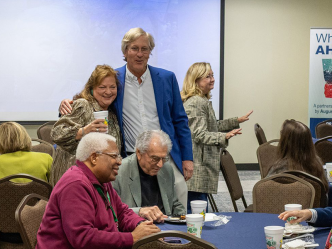Augusta University’s PhD in computer and cyber sciences, a new program offered by the rapidly growing School of Computer and Cyber Sciences, is accepting applications for fall 2022.
The school has added more than 20 faculty in the last three years and is currently recruiting for another 10 faculty openings.
The school also has research momentum with more than $6 million of new National Science Foundation funding obtained in the last 15 months, together with other funding from the Department of Defense and the National Security Administration.
“This program builds on the research strengths created in the School of Computer and Cyber Sciences over the last two to three years,” said Dr. Gagan Agrawal, associate dean of research and graduate studies for the School of Computer and Cyber Sciences. “New PhD students will become an integral part of this momentum from the beginning.”
The program offers an opportunity for new doctoral students desiring close interactions with research-oriented faculty in a city with low cost of living and a warm climate.
The primary research areas for the PhD program are parallel and distributed computing; security and privacy; programming languages, software engineering, and formal methods; internet of things (IoT) and edge computing and cyber-physical systems; and information systems.
Admission requirements:
- Sufficient proficiency in English
- CV/resume
- At least two letters of recommendation
- A one-page personal statement
- A Bachelor of Science degree in computer science or a related field (information systems, computer engineering, etc.) from an established program or an evaluation of recent courses
- GRE scores will be waived for fall 2022 applicants
Application deadlines:
- March 1, 2022 for international applicants
- June 15, 2022 for domestic applicants
Admission decisions will be made on a rolling basis and early applications are highly recommended. Accepted full-time students will be funded on teaching and/or research assistantships with a competitive stipend and tuition waiver.
 Augusta University
Augusta University




